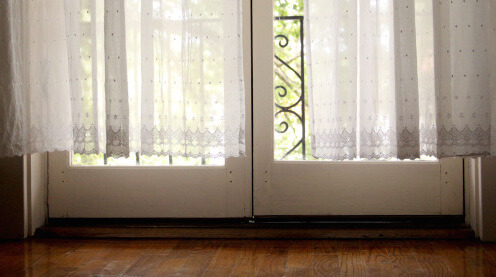Creating Homes of Beauty

In a little-known novel that I love, a British grandmother, after the devastation of World War One, is left with the care of an orphaned grandson and the ache of a war-scarred family. Seeking a way to care for them all, Lucilla (literally, through a broken window) stumbles upon a worn but beautiful old house and has a vision of what it could mean for them all:
And then Lucilla knew what she was going to do with the rest of her life. She was going to build some sort of a refuge, somewhere, to which her children and her grandchildren could escape. Not a permanent escape; even in her grief she still knew that a selfish isolation is the sure road to hell; but that temporary one which is the right of every man. They were talking a lot just now about the war to end war, and a country fit for heroes to live in. She thought they deceived themselves. She had seen now what life could be, and what man could do when the devil was in him. She had not much hope of any wholesale change; only of the creation of isolated homes of beauty from which, please God, the loveliness should spread. Such a home would she make for her children and her grandchildren. They should come to it weary and sickened and go away made new. They should find peace there, and beauty, and the cleansing of their sins.
“Not much hope of any wholesale change; only of the creation of isolated homes of beauty from which, please God, the loveliness should spread”: this, to me, sums up the whole calling and hope of home-making.
Making a home is perhaps the finest earthly work at which a man or woman can labor. It unites idealism and realism, Plato and Aristotle, hope and hard work, tempering both the tendency towards perfectionism and exactitude in the former, and towards cynicism and resignation in the latter. Homemaking is an art, for like all the arts, it takes earthy, tangible elements and arranges them into something that displays beauty and conveys meaning. Homemaking calls upon the essential human faculties—virtue, creativity, reason—and, by their daily exercise, cultivates human flourishing.
A home is to the family what a body is to the soul; intimately joined, distinguishable but not separable, the two give shape and life to one another. Just as a soul without a body cannot live in this world, so a family without a home—however temporary, however far from an ideal—cannot sustain its own unique, vital life.
There is spiritual work which, for the Christian, is higher and might sometimes take precedence over the work of homemaking, such as worship, evangelism, service. And yet, much of this spiritual work finds its fullest, richest expression within the Christian home, where the prayer “Thy will be done on earth as in heaven” is daily offered and hourly enacted.
Samuel Johnson, as paraphrased by C.S. Lewis, said: “To be happy at home is the end of all human endeavor.” What does this mean for the work of teaching and learning? All the homework assignments, all the classroom lectures and discussions, all the subjects and assessments, even all the distinguished colleges and vocations and accomplishments we hope their education will help our students attain—these all, ultimately, lead back to the great work of homemaking, played out in the gear, tackle, and trim of kitchen utensils, lawn mowers, toolboxes, mops, chore lists, family dinners, hospitality.
For it is in these isolated homes, in these mundane tasks, that the labor of beauty, the embodiment of truth, and the integrity of goodness can be known by both dweller and guest.

Lindsey Brigham Knott
Lindsey Knott relishes the chance to learn literature, composition, rhetoric, and logic alongside her students at a classical school in her North Florida hometown. She and her husband Alex keep a home filled with books, instruments, and good company.










